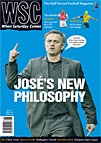 Political pressure is being applied to Europe’s richest clubs and a wide-ranging recent report by a Belgian MEP has found an unlikely but powerful ally. Paul Joyce examines why
Political pressure is being applied to Europe’s richest clubs and a wide-ranging recent report by a Belgian MEP has found an unlikely but powerful ally. Paul Joyce examines why
In March, the European Parliament took its first steps towards a firm commitment to sport by adopting Belgian MEP Ivo Belet’s report on the future of professional football in Europe. The document called upon the European Commission to resolve the legal uncertainties surrounding football, to facilitate the self-regulation of governing bodies such as UEFA and to tackle issues such as hooliganism, racism and money laundering. UEFA’s “home-grown players” initiative and the expansion of Supporters’ Trusts in Europe were also endorsed by the parliament.
The greatest potential for conflict with football’s hierarchy, however, lies in Belet’s plans to “stop the financial race that increases the gap between larger, wealthier clubs and smaller, poorer ones”. Measures aimed at combating “the growing concentration of economic wealth and sports power” include the collectivisation of the sale of TV rights in member countries.
At the behest of Real Madrid, whose separate television contract with Mediapro is worth €1.1 billion (£750 million) until 2013, the European Parliament has already deleted a paragraph from the Belet report which stated that the individual sale of broadcasting rights “threatens completely to destroy the competitive balance” of European football. For their part, Premier League clubs informed Richard Caborn in February that UEFA would need to reform itself before they could cede it further powers.
The G-14 will have ample opportunity to dilute further Belet’s proposals. EU Cultural Commissioner Ján Figel’s forthcoming white paper will not be legally binding and, to be implemented in full, any proposals would require three EU directives, each of which would need approval from the Commission and the Council of Ministers. Yet one G-14 member is a vocal supporter of the reforms – Bayern Munich. Arguing that “our current free market has led to irrational conditions”, Karl-Heinz Rummenigge, the chairman of Bayern’s executive board, endorsed the Belet report in full in April and hoped that the EU would include its recommendations in the white paper.
Rummenigge had already threatened to withdraw Bayern from G-14 last November, lambasting the “pure egocentricity” of its members and their lack of communication with UEFA and FIFA. He also became president of UEFA’s European Club Forum, an organisation widely perceived to have been set up as a rival body to G-14.
Over the last year, Rummenigge has addressed numerous EU committees on unfair competition in football. A financially conservative club, Bayern’s huge increase in turnover from €33.3m in 1993 to €204.7m in 2006 has been achieved by prudent budgeting and reinvesting any profits into infrastructure and youth development. “We make a €35m profit; this is required for our investment,” Rummenigge told the European Parliament in May 2006. “Chelsea lost €204m; Mr Abramovich clearly coughed this up. This is not acceptable.”
Rummenigge has in fact gone further than the Belet report in urging the EU to limit clubs’ salary expenditure to 50 per cent of their turnover – Bayern themselves boast a 42 per cent ratio. He is also highly critical of the sale of individual broadcasting rights by leading Spanish clubs. “It would be the eighth wonder of the world if Werder Bremen could knock Barcelona out of the Champions League,” Rummenigge observed in November. “Bremen earn €23m from football – Barcelona €143m.”
Yet Rummenigge’s sudden advocacy of central marketing appears jaw-droppingly hypocritical. Bayern were accused in 2003 of breaching the Bundesliga’s collective bargaining pact when it emerged that they had concluded a secret €21.5m deal with the Kirch media group. Club chairman Franz Beckenbauer stated that he would rather move the side to the Italian league than pay the money back. In 2005, Rummenigge blamed Bayern’s failures in Europe on the “distribution madness” which allocated them the same domestic TV income as lowly SC Freiburg. The following year, he forced through a sliding scale of payments that rewarded sides finishing highest in the Bundesliga (inevitably, Bayern) by threatening to sell the club’s broadcast rights individually to the pay-TV channel Premiere.
Bayern’s calls for a level playing field apply only to European club competitions where they are at a financial disadvantage, and only since the Bundesliga’s broadcast revenue fell way behind that of other countries’ leagues. Although last year’s €430m media rights deal constituted a 42 per cent increase in annual income, Rummenigge accused the German league of “being asleep for ten years”, notably regarding the sale of TV rights overseas, which net a mere €20m per annum. “I still think that our excessive solidarity has led to us being weaker internationally,” Rummenigge said of the Bundesliga in April. “That’s why we need central marketing everywhere in Europe.”
Rummenigge’s castigation of European inequalities handily distracts from Bayern’s own errors in a disastrous season; they could fail to qualify for the Champions League for the first time since 1996. More damagingly, this hijacking of the post-Belet debate threatens to divert attention from broader social concerns outlined in the report, such as the prevention of child trafficking. The founder of the organisation Culture Foot Solidaire, ex-Cameroon international Jean-Claude Mbvoumin, told an EU committee in February about the plight of homeless young African players abandoned by their agents on arrival in France. “Football is not only about money and TV rights,” Mbvoumin warned. “There are more important things, like these young people.”
From WSC 244 June 2007. What was happening this month